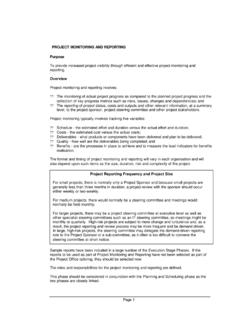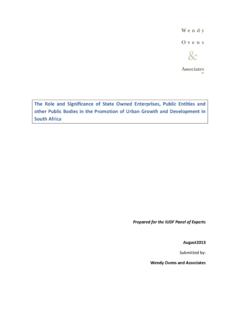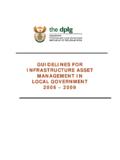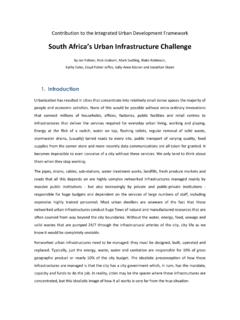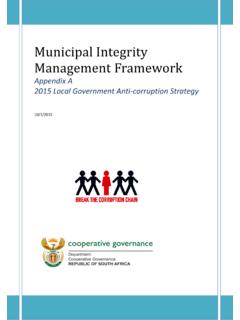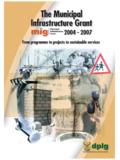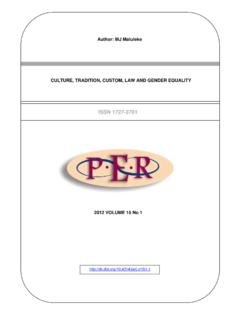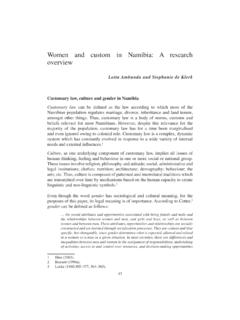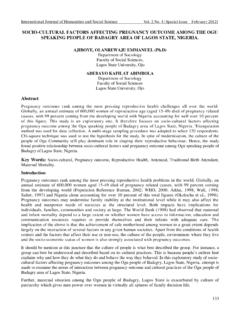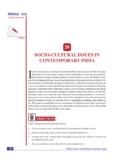Transcription of TRADITIONAL LEADERSHIP AND GOVERNANCE …
1 TRADITIONAL LEADERSHIP AND GOVERNANCE FRAMEWORK. ACT 41 OF 2003. [ASSENTED TO [DATE OF. 11 DECEMBER COMMENCEMENT: 24. 2003] SEPTEMBER 2004]. (English text signed by the President). as amended by TRADITIONAL LEADERSHIP and GOVERNANCE Framework Amendment Act 23 of 2009. ACT. To provide for the recognition of TRADITIONAL communities; to provide for the establishment and recognition of TRADITIONAL councils; to provide a statutory framework for LEADERSHIP positions within the institution of TRADITIONAL LEADERSHIP , the recognition of TRADITIONAL leaders and the removal from office of TRADITIONAL leaders; to provide for houses of TRADITIONAL leaders; to provide for the functions and roles of TRADITIONAL leaders; to provide for dispute resolution and the establishment of the Commission on TRADITIONAL LEADERSHIP Disputes and Claims; to provide for a code of conduct.
2 To provide for amendments to the Remuneration of Public Office Bearers Act, 1998; and to provide for matters connected therewith. Preamble WHEREAS the State, in accordance with the Constitution, seeks- * to set out a national framework and norms and standards that will define the place and role of TRADITIONAL LEADERSHIP within the new system of democratic GOVERNANCE ;. * to transform the institution in line with constitutional imperatives; and * to restore the integrity and legitimacy of the institution of TRADITIONAL LEADERSHIP in line with customary law and practices;. AND WHEREAS the South African indigenous people consist of a diversity of cultural communities.
3 AND WHEREAS the Constitution recognises- * the institution, status and role of TRADITIONAL LEADERSHIP according to customary law; and * a TRADITIONAL authority that observes a system of customary law;. AND WHEREAS- * the State must respect, protect and promote the institution of TRADITIONAL LEADERSHIP in accordance with the dictates of democracy in South Africa;. * the State recognises the need to provide appropriate support and capacity building to the institution of TRADITIONAL LEADERSHIP ;. * the institution of TRADITIONAL LEADERSHIP must be transformed to be in harmony with the Constitution and the Bill of Rights so that- - democratic GOVERNANCE and the values of an open and democratic society may be promoted; and - gender equality within the institution of TRADITIONAL LEADERSHIP may progressively be advanced; and * the institution of TRADITIONAL LEADERSHIP must- - promote freedom, human dignity and the achievement of equality and non-sexism.
4 - derive its mandate and primary authority from applicable customary law and practices;. - strive to enhance tradition and culture;. - promote nation building and harmony and peace amongst people;. - promote the principles of co-operative GOVERNANCE in its interaction with all spheres of government and organs of state; and - promote an efficient, effective and fair dispute-resolution system, and a fair system of administration of justice, as envisaged in applicable legislation, BE IT THEREFORE ENACTED by the Parliament of the Republic of South Africa, as follows:- ARRANGEMENT OF SECTIONS. Sections CHAPTER 1. INTERPRETATION AND APPLICATION.
5 1 Definitions and application CHAPTER 2. KINGSHIPS OR QUEENSHIPS, PRINCIPAL TRADITIONAL LEADERS, PRINCIPAL. TRADITIONAL COMMUNITIES, TRADITIONAL COMMUNITIES, PRINCIPAL. TRADITIONAL COUNCILS, KINGSHIP OR QUEENSHIP COUNCILS AND. TRADITIONAL COUNCILS (ss 2-7). [Heading substituted by s. 2 of Act 23 of 2009.]. 2 Recognition of TRADITIONAL communities 2A Recognition of kingships or queenships [S. 2A inserted by s. 3 of Act 23 of 2009.]. 2B Recognition of principal TRADITIONAL communities [S. 2B inserted by s. 3 of Act 23 of 2009.]. 3 Establishment and recognition of TRADITIONAL councils 3A Establishment and recognition of kingship or queenship councils [S.]
6 3A inserted by s. 5 of Act 23 of 2009.]. 3B Establishment and recognition of principal TRADITIONAL councils [S. 3B inserted by s. 6 of Act 23 of 2009.]. 4 Functions of TRADITIONAL councils 4A Functions of kingship or queenship councils [S. 4A inserted by s. 7 of Act 23 of 2009.]. 4B Establishment and functions of TRADITIONAL sub-councils [S. 4B inserted by s. 7 of Act 23 of 2009.]. 4C Functions of principal TRADITIONAL councils [S. 4C inserted by s. 7 of Act 23 of 2009.]. 5 Partnerships between district and local municipalities and kingship and queenship councils, principal TRADITIONAL councils and TRADITIONAL councils [S.
7 5 substituted by s. 8 of Act 23 of 2009.]. 6 Support to TRADITIONAL councils, principal TRADITIONAL councils and kingship or queenship councils [S. 6 substituted by s. 9 of Act 23 of 2009.]. 7 Withdrawal of recognition of TRADITIONAL communities CHAPTER 3. LEADERSHIP POSITIONS WITHIN INSTITUTION OF TRADITIONAL LEADERSHIP . Part 1. Introduction 8 Recognition of TRADITIONAL LEADERSHIP positions Part 2. Kings and queens 9 Recognition of kings and queens 10 Removal of kings or queens Part 2A. Principal TRADITIONAL leaders [Part 2A inserted by s. 13 of Act 23 of 2009.]. 10A Recognition of principal TRADITIONAL leaders [S. 10A inserted by s.
8 13 of Act 23 of 2009.]. 10B Removal of principal TRADITIONAL leaders [S. 10B inserted by s. 13 of Act 23 of 2009.]. Part 3. Senior TRADITIONAL leaders, headmen and headwomen 11 Recognition of senior TRADITIONAL leaders, headmen or headwomen 12 Removal of senior TRADITIONAL leaders, headmen or headwomen Part 4. General provisions regarding TRADITIONAL leaders 13 Recognition of regents 14 Persons acting as TRADITIONAL leader 15 Deputy TRADITIONAL leaders CHAPTER 4. HOUSES OF TRADITIONAL LEADERS. 16 Houses of TRADITIONAL leaders in Republic 17 Local houses of TRADITIONAL leaders 18 Referral of Bills to National House of TRADITIONAL Leaders CHAPTER 5.
9 ROLES AND FUNCTIONS OF TRADITIONAL LEADERSHIP . 19 Functions of TRADITIONAL leaders 20 Guiding principles for allocation of roles and functions CHAPTER 6. DISPUTE AND CLAIM RESOLUTION AND COMMISSION ON TRADITIONAL . LEADERSHIP DISPUTES AND CLAIMS. [Chapter 6 substituted by s. 20 of Act 23 of 2009.]. 21 Dispute and claim resolution [S. 21 substituted by s. 20 of Act 23 of 2009.]. 22 Establishment of Commission [S. 22 substituted by s. 20 of Act 23 of 2009.]. 23 Appointment of members of Commission [S. 23 substituted by s. 20 of Act 23 of 2009.]. 24 Vacancies [S. 24 substituted by s. 20 of Act 23 of 2009.]. 24A Conditions of appointment of members of Commission [S.]
10 24A substituted by s. 20 of Act 23 of 2009.]. 24B Support to and reports by Commission [S. 24B substituted by s. 20 of Act 23 of 2009.]. 25 Functions of Commission [S. 25 substituted by s. 20 of Act 23 of 2009.]. 26 Recommendations of Commission [S. 26 substituted by s. 20 of Act 23 of 2009.]. 26A Committees of Commission [S. 26A inserted by s. 20 of Act 23 of 2009.]. CHAPTER 7. GENERAL PROVISIONS. 27 Code of conduct 27A Regulatory powers [S. 27A inserted by s. 21 of Act 23 of 2009.]. 28 Transitional arrangements 29 Amendment of Act 20 of 1998, as amended by Act 21 of 2000. 30 Short title and commencement Schedule CHAPTER 1.
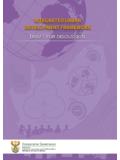
![Disaster Management Act [No. 57 of 2002]](/cache/preview/e/5/d/2/b/3/6/7/thumb-e5d2b36743b64ebe9204d7e874f734ad.jpg)
